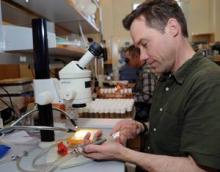 UC Merced Assistant Professor Fred Wolf is trying to better understand the biological basis of alcoholism.
UC Merced Assistant Professor Fred Wolf is trying to better understand the biological basis of alcoholism.
To do so, Wolf and his research team are studying fruit fly brains.
"Fruit flies have a brain. That's something that many people don't know," he said. "Their brain is a millionfold simpler than ours, but that's still a very complicated brain. And flies, like people, have a very long association with alcohol. It's in their favorite food source; it's in rotten fruit, which is what fruit flies usually eat in the wild."
Alcoholism is the most prevalent form of drug abuse in the world, Wolf said, and the harm that it causes to society is much greater than other drugs that are abused.
There are behavioral interventions such as Alcoholics Anonymous, Wolf said, that help many people combat their abuse. But there's a high recidivism rate -- people go back to drinking pretty easily, he said.
The goal of the research is to understand more about the biology of how alcohol affects people.
If researchers are able to better understand what happens in the brain, they can develop a medical or behavioral intervention to more effectively deal with alcoholism.
But the problem with humans is that you can't study them very well because you can't go into their brains, Wolf said. "With fruit flies, you can do some very concise experiments," he said.
Researchers found that there are many more similarities between fly brains and human brains than previously thought, Wolf said.
"We think that some of the information we've learned about how the alcohol affects the fly brain will be directly applicable to humans," he said, "So some of the stuff that we can learn from flies we can apply to humans eventually."
There have been two interesting findings, he said.
Wolf said one of them is that a fly brain is affected by alcohol in a way that's similar to the way a human brain is affected by it. He said the second finding suggests a new way to look at how alcohol affects vertebrate brains.
All abused drugs affect a specific pathway in the human brain, Wolf said, and that involves the neurotransmitter called dopamine. Dopamine released in the brain, he said, is often thought of as a rewarding signal for alcohol users.
"When we went to the fruit flies, we said 'OK, maybe the dopamine is also involved in fruit flies' response to alcohol,' and through a whole bunch of experiments we were able to show that dopamine does have very similar effects in flies as in higher organisms," he said.
Wolf and his team gave flies alcohol and looked at how genes in the flies' brains reacted. They focused on genes that showed interesting patterns of changes and are studying those genes further, he said.
"One of them that we chose turned out to be exclusively expressed in the cells of the brain that are called glial cells," he said.
From his research, it seems that glial cells have a role in alcohol response, something that wasn't known to occur in any organisms.
"So now we are pursuing that," he said.
Researchers will be working with the genes affected in the glial cells to see how they communicate with neurons.
David Feldman, a lab technician, said he began to work on this research in February.
UC Merced graduate student Sarah Parkhurst, undergraduate student Ben Ziman and postdoctoral researcher Ariele Legendre, are part of Wolf's team.



